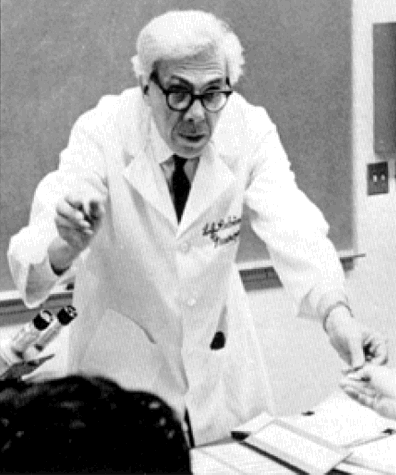
Dear colleagues and friends,
Greetings to you all from God’s own country!!
I do hope that most of you would have read the first ‘write-up’ on Legends in Neuropathology. In continuation with that I am sending the second ‘write-up’ on Professor Lucien J Rubinstein.
I would welcome suggestions from you, as I consider that this will make it more interesting reading material, in particular for the younger f members of our society.
Best wishes
Radhakrishnan.
E-mail: [email protected]
Mobile: 7736564675
Lucien Rubinstein was born in Antwerp, Belgium on October 15, 1924, but immigrated to England during the Second World War. After a year at Queen Mary College, he was admitted to the Medical College of London Hospital, from which he graduated as an M.D. in 1952. After his military service, he joined the staff of the Bernhard Baron Institute of Pathology at the Royal London Hospital and collaborated with Professor Dorothy Russell. After a sabbatical year in which his time was split between the University of Minnesota and the National Institutes of Health, he moved to the US permanently in 1961. After 3 years at the Montefiore Hospital in New York, in 1964 he accepted a professorship in the Neuropathology Department at Stanford University. Dr. Rubinstein became the director of the Division of Neuropathology at the University of Virginia in April 1981.
Rubinstein had a very productive life; his contributions and collaboration with Dr. Dorothy S. Russell led to the textbook Pathology of Tumours of Nervous System , which was first published in 1959. This book has been the most authoritative and scholarly work in the field of neuro-oncology. Dr. Rubinstein wrote five editions of Pathology of Tumours of the Nervous System , the Atlas on Tumors of the Central Nervous System , 139 articles in the literature,] book chapters, more than 50 published papers presented at national and international meetings, and the translation of the Manual of Basic Neuropathology by Escourolle and Poirier. He had editorial responsibilities for Neuropathology and Applied Neurobiology, the Journal of Neuropathology and Experimental Neurology, Acta Neuropathologica, Clinical Neuropathology, Journal of Neuro-oncology, Cancer , and Virchow’s Archiv. He was an advisor to the Commission on the Histopathological Classification and Nomenclature of Tumors of the World Health Organization.
His professional life was dedicated to understanding the cytogenesis and differentiation of CNS tumors. He was a great teacher and a mentor who participated in the education of more than 50 trainees and visiting scholars from nine different countries. Neuropathology was his life and it was a pleasure so much above and beyond being a duty that he put all his soul into it; that could be well appreciated by his own words: As a pioneer in neuropathology, in his work Dr. Rubinstein set the foundation for many enduring concepts in neurosurgery, neuro-oncology, neurology, and basic tumor biology.
Dr. Rubinstein had diverse interests in life, including classical music, literature, theater, and wine. He was a good companion. Although English was not his native language, he mastered it; his colleagues admired his ability to describe morphological features with his precise English. Dr. Rubinstein passed away in 1990 due to the complications of a basilar artery aneurysm. He was in peace when he died. Just before his death he expressed to Dr. VandenBerg, “I pine for nothing. My work is finished, the book is done, and we’ve got research projects going but this can be carried on.